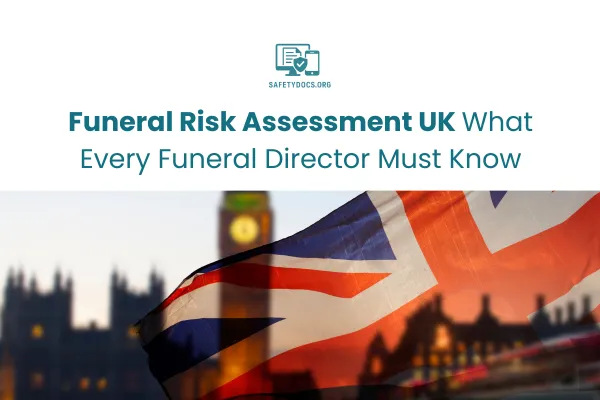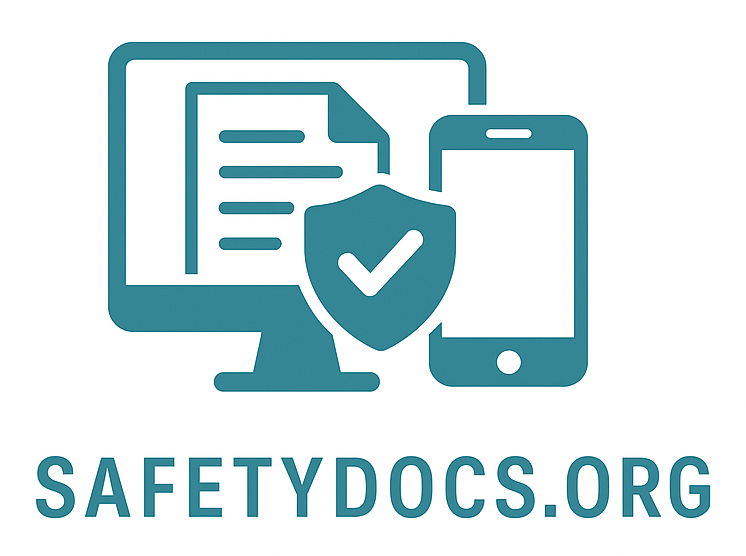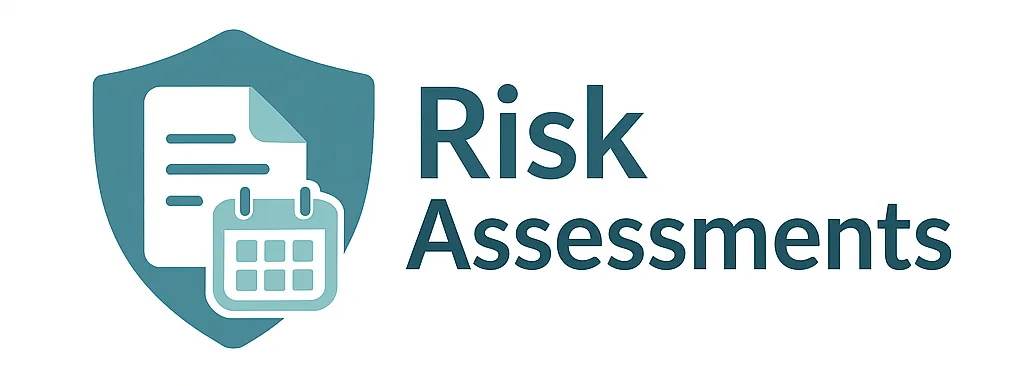
Funeral Risk Assessment UK for Legal Safety
Organising a funeral in the UK is more than just arranging a ceremony. It carries legal responsibilities that funeral directors and event organisers must meet, particularly when it comes to ensuring the safety of everyone involved. A properly conducted funeral risk assessment UK is not just a best practice it is fast becoming a legal requirement.
With increased awareness of public safety and terrorism threats, and the introduction of Martyn’s Law funeral compliance, the landscape is shifting. Any funeral, especially those held in public spaces or involving large groups, must now meet new standards set by both local and national regulations. For those managing large funeral event planning UK, these expectations are even more demanding.
In this article, we break down exactly what funeral professionals need to know to stay compliant with UK public funeral legislation, including the Protect Duty funeral requirements and the funeral licensing requirements UK. By understanding these obligations and acting on them, funeral directors can prevent legal issues, protect the public, and maintain a respectful, safe environment for grieving families.
Why Funeral Risk Assessments Are Legally and Ethically Essential
Funerals are emotionally charged gatherings that can draw large crowds in a short amount of time. Without proper risk planning, the likelihood of accidents, disruptions, or even security threats increases significantly. That’s why a funeral risk assessment UK is a core requirement not just to fulfil the law but to honour the safety of everyone attending.
Ignoring a formal assessment can leave organisers open to legal claims if incidents occur. It also reflects poorly on the professionalism of the service provider. Given the heightened expectations from both the public and the government, skipping a risk assessment is no longer an option.
From venue safety to crowd control, and from emergency access routes to weather-related planning, funeral risk assessments touch every part of the event. For larger services, such as celebrity funerals, community leaders, or high-profile cases, the risks and required actions become more complex. This is where large funeral event planning UK comes into sharp focus.
What Martyn’s Law Means for Funeral Organisers
Martyn’s Law funeral compliance is a developing piece of UK legislation aimed at improving public protection at events and venues. It’s part of the wider Protect Duty, which places a legal obligation on venue operators and event organisers to take steps against possible terrorist threats.
While many think Martyn’s Law only applies to concert halls or stadiums, it also covers venues used for funerals, particularly those accessible to the public or holding larger gatherings.
Key principles of Martyn’s Law funeral compliance include:
Performing formal risk assessments for terrorism and other threats.
Creating action plans to respond to possible incidents.
Training staff and volunteers in emergency procedures.
Coordinating with local emergency services when required.
By incorporating these steps into your funeral risk assessment UK, you not only meet new expectations but also help protect vulnerable attendees at an already difficult time.
The Complexity of Large Funeral Event Planning UK
Planning a small family funeral is one thing. Organising a public funeral for a community leader, a tragic youth death, or a local hero is another matter entirely. Large funeral event planning UK comes with distinct challenges that require a more detailed approach to risk management.
Events with hundreds of mourners bring logistical and legal concerns, including:
Managing large vehicle flows and parking.
Ensuring disabled access and safe entry/exit routes.
Providing first aid coverage.
Coordinating with traffic enforcement officers and police.
Creating overflow plans for unexpected crowd sizes.
These large-scale funerals often require early engagement with local councils, police departments, and health services. A thorough funeral risk assessment for such events should not be left until the last minute. Every funeral director must treat crowd management and public safety as a core responsibility, not a secondary task.
Funeral Licensing Requirements UK: What’s Required?
Unlike weddings or concerts, there is no national license for funeral services. However, that doesn’t mean you’re free from legal obligations. There are several funeral licensing requirements UK that apply, particularly when events are held in public venues or when services may impact local traffic or safety.
These include:
Venue licensing: Some funeral venues must have a valid premises licence, especially if they include music or public address systems.
Environmental health compliance: Particularly relevant for cremations and services involving body transportation.
Traffic and crowd control approvals: These may be required from local councils for larger events.
Public liability insurance: This is vital in case of injuries or property damage during the event.
Ignoring these licensing requirements can result in fines, enforcement actions, or even forced cancellations. A comprehensive funeral risk assessment UK should factor in all necessary local and national approvals before proceeding.
Aligning with UK Public Funeral Legislation
Funeral professionals must understand the broader legal context surrounding funerals. The UK public funeral legislation incorporates various health and safety laws that apply to public gatherings, including:
Health and Safety at Work Act 1974
The Management of Health and Safety at Work Regulations 1999
The Civil Contingencies Act 2004
While these aren’t funeral-specific laws, they apply to any public event where safety risks exist. That’s why completing a funeral risk assessment UK isn’t just suggested it’s legally supported and, in many cases, expected.
Funeral organisers should take the same approach that festival and event planners do: conduct a risk assessment, plan mitigation strategies, and document it all. This makes it clear to insurers, authorities, and the public that every care has been taken to meet your legal obligations.
Avoiding Common Mistakes in Funeral Risk Planning
Even experienced funeral directors can make oversights when planning large or complex events. These missteps can lead to legal issues, event disruption, or poor community trust.
Common errors include:
Treating small funerals as risk-free.
Assuming the venue will handle all compliance.
Not updating plans for outdoor or weather-related changes.
Forgetting to communicate the risk plan to staff.
Relying on last-minute solutions rather than planning.
A structured funeral risk assessment UK helps avoid these problems by giving you a clear roadmap. You’ll know what to prepare, who is responsible for each part, and how to respond to challenges on the day.
How to Conduct a Professional Funeral Risk Assessment UK
Carrying out a proper funeral risk assessment UK involves several key steps, each designed to make the process simple yet thorough.
Step 1: Identify All Hazards
Think beyond the obvious. Are there slippery surfaces? Is the location prone to traffic jams or poor lighting? Could a medical emergency occur?
Step 2: Evaluate Who Might Be at Risk
This includes elderly attendees, disabled individuals, drivers, pedestrians, and even staff working the event.
Step 3: Assess the Level of Risk
Decide how likely each hazard is to cause harm and what the impact might be.
Step 4: Take Preventive Action
Once you’ve evaluated the risks, list out actions to reduce or remove them. This could involve signage, staffing, or choosing another venue.
Step 5: Document Everything
Keep a written record of your findings and planned actions. This is key if authorities ask for proof of your compliance.
Step 6: Review and Update
Conditions change. Check your plan again just before the funeral to make sure everything is still relevant and realistic.
Even for small funerals, following these steps shows that you’ve taken your duty of care seriously and have done everything possible to protect attendees.
How Legislation Is Evolving and Why It Matters
As the UK government continues to focus on public protection, compliance measures will only become stricter. New policies under Martyn’s Law funeral compliance and Protect Duty funeral requirements could soo become mandatory ,for all public funeral events.
By preparing now and embedding funeral risk assessment UK processes into your standard operations, you protect not only your clients but also your business. Compliance is more than ticking a box it’s about showing respect, professionalism, and care during some of the most sensitive moments in people’s lives.
Being proactive today also means you’re ready for future inspections, licensing checks, or legislative changes. Instead of reacting under pressure, you’ll already have strong procedures in place that meet or exceed government expectations.
FAQs
1. What is the main goal of a funeral safety assessment?
The aim is to identify and manage any risks that could harm attendees, staff, or the general public during a service.
2. Who is responsible for assessing safety during a funeral?
The funeral organiser or director is typically responsible for managing all aspects of event safety and legal compliance.
3. Does Martyn’s Law apply to all funeral services?
It mainly affects public or large-scale services, but many funeral venues are expected to follow its key principles.
4. Are small funerals exempt from risk planning?
No, even small gatherings should have basic safety planning in place to protect attendees and meet duty of care.
5. What documents should be kept for legal protection?
A written risk assessment, proof of insurance, and any communication with authorities should be saved and updated as needed.
Conclusion
The responsibility of a funeral director goes beyond delivering a respectful ceremony. Ensuring public safety through a thorough funeral risk assessment UK is a legal and ethical requirement. With the rise of Martyn’s Law funeral compliance and growing pressure to meet Protect Duty funeral requirements, the importance of risk planning is clearer than ever.
If you’re involved in large funeral event planning UK, your duty is even greater. Understand the laws, meet the funeral licensing requirements UK, and make sure your services comply with current UK public funeral legislation. Doing so isn’t just about avoiding penalties it’s about providing safe, lawful, and trusted care for grieving families.

